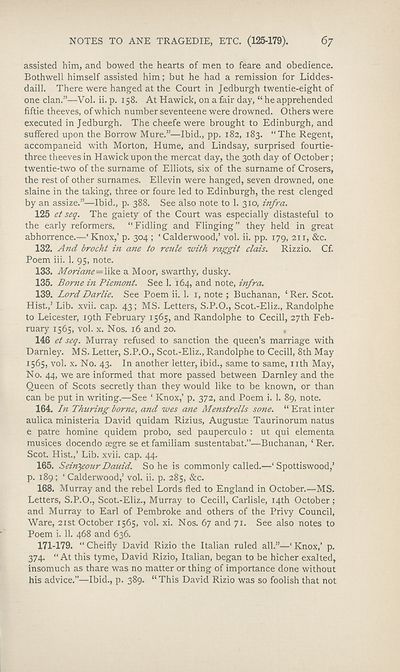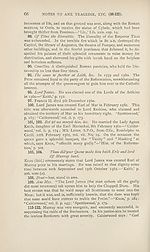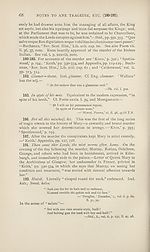Scottish Text Society publications > Old series > Satirical poems of the time of the reformation > Volume 2, 1893
(83)
Download files
Complete book:
Individual page:
Thumbnail gallery: Grid view | List view

NOTES TO ANE TRAGEDIE, ETC. (125-179).
6/
assisted him, and bowed the hearts of men to feare and obedience.
Bothwell himself assisted him; but he had a remission for Liddes-
daill. There were hanged at the Court in Jedburgh twentie-eight of
one clan.”—Vol. ii. p. 158. At Hawick, on a fair day, “ he apprehended
fiftie theeves, of which number seventeene were drowned. Others were
executed in Jedburgh. The cheefe were brought to Edinburgh, and
suffered upon the Borrow Mure.”—Ibid., pp. 182, 183. “The Regent,
accompaneid with Morton, Hume, and Lindsay, surprised fourtie-
three theeves in Hawick upon the mercat day, the 30th day of October;
twentie-two of the surname of Elliots, six of the surname of Crosers,
the rest of other surnames. Ellevin were hanged, seven drowned, one
slaine in the taking, three or foure led to Edinburgh, the rest clenged
by an assize.”—Ibid., p. 388. See also note to 1. 310, infra.
125 et seq. The gaiety of the Court was especially distasteful to
the early reformers. “ Fidling and Flinging” they held in great
abhorrence.—‘ Knox,’ p. 304 ; ‘ Calderwood,’ vol. ii. pp. 179, 211, &c.
132. And brocht in ane to rente with raggit dais. Rizzio. Cf.
Poem iii. 1. 95, note.
133. Mori ane = X\Ye a Moor, swarthy, dusky.
135. Borne in Piemont. See 1. 164, and note, infra.
139. Lord Darlie. See Poem ii. 1. 1, note ; Buchanan, ‘ Rer. Scot.
Hist.,’ Lib. xvii. cap. 43; MS. Letters, S.P.O., Scot.-Eliz., Randolphe
to Leicester, 19th February 1565, and Randolphe to Cecill, 27th Feb¬
ruary 1565, vol. x. Nos. 16 and 20. ,
146 et seq. Murray refused to sanction the queen’s marriage with
Darnley. MS. Letter, S.P.O., Scot.-Eliz., Randolphe to Cecill, 8th May
i565, vol. x. No. 43. In another letter, ibid., same to same, nth May,
No. 44, we are informed that more passed between Darnley and the
Queen of Scots secretly than they would like to be known, or than
can be put in writing.—See ‘ Knox,’ p. 372, and Poem i. 1. 89, note.
164. In Thuring borne, and wes ane Menstrells sotie. “ Erat inter
aulica ministeria David quidam Rizius, Augustse Taurinorum natus
e patre homine quidem probo, sed pauperculo : ut qui elementa
musices docendo aegre se et familiam sustentabat.”—Buchanan, ‘ Rer.
Scot. Hist.,’ Lib. xvii. cap. 44.
165. Sein^eour Dauid. So he is commonly called.—‘ Spottiswood,’
p. 189; ‘ Calderwood,’ vol. ii. p. 285, &c.
168. Murray and the rebel Lords fled to England in October.—MS.
Letters, S.P.O., Scot.-Eliz., Murray to Cecill, Carlisle, 14th October ;
and Murray to Earl of Pembroke and others of the Privy Council,
Ware, 21st October 1565, vol. xi. Nos. 67 and 71. See also notes to
Poem i. 11. 468 and 636.
171-179. “Cheifly David Rizio the Italian ruled all.”—‘Knox,’ p.
374. “At this tyme, David Rizio, Italian, began to be hicher exalted,
insomuch as thare was no matter or thing of importance done without
his advice.”—Ibid., p. 389. “This David Rizio was so foolish that not
6/
assisted him, and bowed the hearts of men to feare and obedience.
Bothwell himself assisted him; but he had a remission for Liddes-
daill. There were hanged at the Court in Jedburgh twentie-eight of
one clan.”—Vol. ii. p. 158. At Hawick, on a fair day, “ he apprehended
fiftie theeves, of which number seventeene were drowned. Others were
executed in Jedburgh. The cheefe were brought to Edinburgh, and
suffered upon the Borrow Mure.”—Ibid., pp. 182, 183. “The Regent,
accompaneid with Morton, Hume, and Lindsay, surprised fourtie-
three theeves in Hawick upon the mercat day, the 30th day of October;
twentie-two of the surname of Elliots, six of the surname of Crosers,
the rest of other surnames. Ellevin were hanged, seven drowned, one
slaine in the taking, three or foure led to Edinburgh, the rest clenged
by an assize.”—Ibid., p. 388. See also note to 1. 310, infra.
125 et seq. The gaiety of the Court was especially distasteful to
the early reformers. “ Fidling and Flinging” they held in great
abhorrence.—‘ Knox,’ p. 304 ; ‘ Calderwood,’ vol. ii. pp. 179, 211, &c.
132. And brocht in ane to rente with raggit dais. Rizzio. Cf.
Poem iii. 1. 95, note.
133. Mori ane = X\Ye a Moor, swarthy, dusky.
135. Borne in Piemont. See 1. 164, and note, infra.
139. Lord Darlie. See Poem ii. 1. 1, note ; Buchanan, ‘ Rer. Scot.
Hist.,’ Lib. xvii. cap. 43; MS. Letters, S.P.O., Scot.-Eliz., Randolphe
to Leicester, 19th February 1565, and Randolphe to Cecill, 27th Feb¬
ruary 1565, vol. x. Nos. 16 and 20. ,
146 et seq. Murray refused to sanction the queen’s marriage with
Darnley. MS. Letter, S.P.O., Scot.-Eliz., Randolphe to Cecill, 8th May
i565, vol. x. No. 43. In another letter, ibid., same to same, nth May,
No. 44, we are informed that more passed between Darnley and the
Queen of Scots secretly than they would like to be known, or than
can be put in writing.—See ‘ Knox,’ p. 372, and Poem i. 1. 89, note.
164. In Thuring borne, and wes ane Menstrells sotie. “ Erat inter
aulica ministeria David quidam Rizius, Augustse Taurinorum natus
e patre homine quidem probo, sed pauperculo : ut qui elementa
musices docendo aegre se et familiam sustentabat.”—Buchanan, ‘ Rer.
Scot. Hist.,’ Lib. xvii. cap. 44.
165. Sein^eour Dauid. So he is commonly called.—‘ Spottiswood,’
p. 189; ‘ Calderwood,’ vol. ii. p. 285, &c.
168. Murray and the rebel Lords fled to England in October.—MS.
Letters, S.P.O., Scot.-Eliz., Murray to Cecill, Carlisle, 14th October ;
and Murray to Earl of Pembroke and others of the Privy Council,
Ware, 21st October 1565, vol. xi. Nos. 67 and 71. See also notes to
Poem i. 11. 468 and 636.
171-179. “Cheifly David Rizio the Italian ruled all.”—‘Knox,’ p.
374. “At this tyme, David Rizio, Italian, began to be hicher exalted,
insomuch as thare was no matter or thing of importance done without
his advice.”—Ibid., p. 389. “This David Rizio was so foolish that not
Set display mode to: Large image | Zoom image | Transcription
Images and transcriptions on this page, including medium image downloads, may be used under the Creative Commons Attribution 4.0 International Licence unless otherwise stated. ![]()
| Publications by Scottish clubs > Scottish Text Society publications > Old series > Satirical poems of the time of the reformation > Volume 2, 1893 > (83) |
|---|
| Permanent URL | https://digital.nls.uk/107427755 |
|---|
| Attribution and copyright: |
|
|---|
| Description | A collection of over 100 Scottish texts dating from around 1400 to 1700. Most titles are in Scots, and include editions of poetry, drama, and prose by major Scottish writers such as John Barbour, William Dunbar, Gavin Douglas, and George Buchanan. Edited by a key scholarly publisher of Scotland's literary history, and published from the late 19th century onwards by the Scottish Text Society. Available here are STS series 1-3. |
|---|

